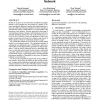Free Online Productivity Tools
i2Speak
i2Symbol
i2OCR
iTex2Img
iWeb2Print
iWeb2Shot
i2Type
iPdf2Split
iPdf2Merge
i2Bopomofo
i2Arabic
i2Style
i2Image
i2PDF
iLatex2Rtf
Sci2ools
149
click to vote
KDD
2003
ACM
2003
ACM
Maximizing the spread of influence through a social network
Models for the processes by which ideas and influence propagate through a social network have been studied in a number of domains, including the diffusion of medical and technological innovations, the sudden and widespread adoption of various strategies in game-theoretic settings, and the effects of "word of mouth" in the promotion of new products. Recently, motivated by the design of viral marketing strategies, Domingos and Richardson posed a fundamental algorithmic problem for such social network processes: if we can try to convince a subset of individuals to adopt a new product or innovation, and the goal is to trigger a large cascade of further adoptions, which set of individuals should we target? We consider this problem in several of the most widely studied models in social network analysis. The optimization problem of selecting the most influential nodes is NP-hard here, and we provide the first provable approximation guarantees for efficient algorithms. Using an anal...
Related Content
| Added | 30 Nov 2009 |
| Updated | 30 Nov 2009 |
| Type | Conference |
| Year | 2003 |
| Where | KDD |
| Authors | David Kempe, Jon M. Kleinberg, Éva Tardos |
Comments (0)

